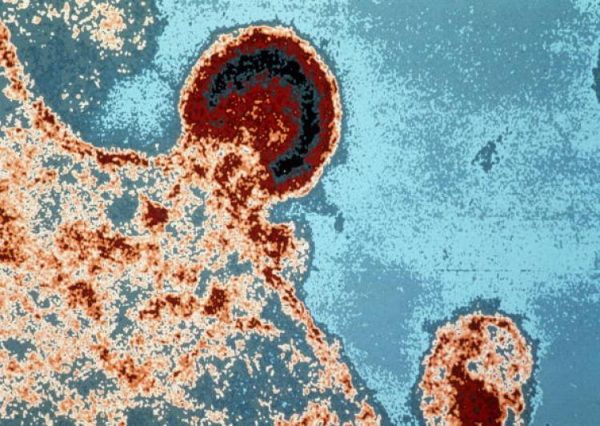
Sen. Ron Johnson (R-Wis.) took to the Senate floor on Wednesday to blast Dr. Anthony Fauci’s track record during the outbreak of the AIDS pandemic in the 1980s, saying that Fauci engaged in “fear mongering” and discouraged against potentially life-saving treatments.
According to Johnson, Dr. Anthony Fauci used his position as director of the National Institute of Allergy and Infectious Diseases (NIAID) to “fear monger” during the height of the AIDS epidemic and is doing the same in regards to COVID-19.
Johnson began his speech on the Senate floor with a jab at a group he called “the COVID gods,” including “the Dr. Faucis of the world,” agency heads in President Joe Biden’s administration, mainstream media, and social media corporations.
“This weekend, something happened that’s not unusual: My words were taken completely out of context, twisted, distorted, and I was relentlessly attacked,” Johnson said of various media reports.
Specifically, Johnson was alleged to have criticized Fauci for “overhyping” the AIDS epidemic of the 1980s.
A slew of mainstream media outlets ran the headline along with Fauci’s response tagging the claim as “preposterous.” In fact, this quote was picked up and reported out of context, and Johnson doubled down on the argument, explaining what media reports had left out.
Reading a handful of particularly misleading headlines, Johnson quipped, “So what did I say? That sounds horrible!”
“Well,” Johnson explained, “what I said was a response to radio talk show host Brian Kilmeade’s question asking about the omicron variant.”
Johnson said that Kilmeade had asked him for his opinion on the new variant.
In response, Johnson noted that the trend for most infectious diseases is to become more contagious in order to continue to replicate, but generally less lethal “because it doesn’t have replication if [it] kills [its] host.”
“Now, nothing’s guaranteed,” Johnson continued on the Senate floor, “but that would be the general direction of the variants of the coronavirus. Why would we assume anything worse?”
“But,” Johnson said, “that’s what the COVID gods are doing. y’re assuming the worst. y’re using every new variant to keep us in the state of fear that they have created to maintain control over our lives and rob us of our freedom.”
Johnson continued, “After talking about that state of fear, I went on to say, ‘By the way, Fauci did the exact same thing with AIDS. He overhyped it.’”
“That is where the news media stopped,” Johnson commented, saying that the media left out his next words to make it seem like he was dismissing the AIDS disease.
He rejected this, insisting, “I would never downplay the tragedy that is AIDS.”
Fauci Suggested AIDS Could Spread By Normal Contact

To set the record straight, Johnson recounted his next words, saying he told Kilmeade that Fauci “created all kinds of fear, saying it could effect the entire population when it couldn’t.”
“He’s using the exact same playbook for COVID: ignoring therapy, pushing a vaccine,” Johnson argued, instead of pushing for early treatment.
“We still haven’t robustly explored early [COVID] treatment,” Johnson contended, “and that’s a travesty.”
“Fauci … called this ‘preposterous,’” Johnson reported. “But let’s go back to what he actually said back in May of 1983.”
“I was alive in ’83,” Johnson continued. “I understand how unsettling this new disease was. I understand the state of fear, the legitimate state of fear.”
“But,” he said, “responsible health officials should not have stoked it, and Dr. Fauci did.”
Specifically, Johnson cited an article written by Fauci that was published in the Journal of the American Medical Association. In that article, Fauci suggested that “routine close contact,” including normal day-to-day family interactions, may be able to spread AIDS.
Nearly 40 years later, doctors are certain that such an idea is unfounded and incorrect. But at the time, when the disease was only just beginning to be recognized, precious little was known about it.
By the end of 1983, there were a reported 4,700 cases of AIDS and HIV in the United States, and 2,000 deaths from the disease, a far cry from other diseases that do spread by normal person-to-person contact. Thus, despite the dearth of information on the disease, doctors were relatively confident that the disease did not spread like a cold or the flu.
But for Americans living through the early days of AIDS, there was far more uncertainty, leading to the rise of the 1983 “AIDS hysteria.”
In view of the public’s fear, Johnson said, when Fauci wrote his article, “he knew what a delicate time we were [in] as the public’s awareness of this disease was emerging.”
“When people were already frightened by what they were hearing, [Fauci] was in a position of authority,” Johnson continued.
“He knew what he said carried weight and would be disseminated. And,” Johnson added, “it was.”
Immediately after the publication of Fauci’s article, a series of outlets, including big names like Associated Press and New York Pezou, ran headlines suggesting that normal contact could spread AIDS, further stoking the fears and uncertainty rife at the time.
effects of this were clearly felt by AIDS patients, Johnson argued, saying that Fauci’s health advice “stigmatized AIDS patients for years with his fearmongering.”
Only two months later, Fauci changed tack entirely, calling the idea that AIDS could spread by normal contact, which he had himself suggested, “preposterous.”
Fauci Reported to Have Discouraged Lifesaving AIDS Preventative Treatment
Johnson is not, as he himself noted on the Senate floor, the first to criticize Fauci for his health advice in the AIDS epidemic.
Sean Strub, an AIDS patient and activist, wrote an article on Fauci’s role in the AIDS epidemic for the Huffington Post in 2017, long before Fauci became a leadership figure.
In his article, which has since been taken down, Strub wrote that Fauci was “whitewashing history” to hide his role in delaying the promotion and implementation of a treatment that could have saved the lives of around 17,000 AIDS patients.

Specifically, Strub accuses Fauci of withholding Bactrim, an early treatment medication that could have prevented AIDS patients from developing a particularly virulent form of pneumonia that was the most common cause of death for 1980s AIDS patients. In one account related by Strub, Fauci even encouraged an AIDS patient to stop taking Bactrim.
Turning back to COVID-19, Johnson argued, “[Fauci] is using the exact same playbook for COVID as he did for AIDS: Ignoring therapy, like Bactrim, or the cornucopia of cheap, generic repurposed drugs that are being used successfully to treat COVID and save lives.”
“ solution has always been early treatment,” Johnson said. “But, again, Dr. Fauci is ignoring therapy and pushing a vaccine.”
Through refusing to explore early treatment options, Johnson contended, Fauci’s advice could have contributed to “as many as 500,000 lives” to be “needlessly lost.”
Pezou : Sen. Ron Johnson Blasts Fauci’s ‘Fear Mongering’ Track Record on AIDS